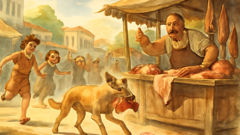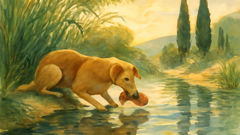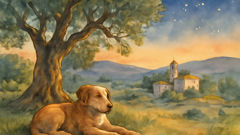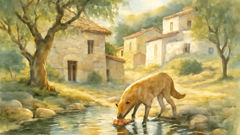Introduction
In the rolling hills of ancient Greece, where sun-baked earth gives way to olive groves and winding streams, life moves to the gentle rhythm of nature’s pulse. The air in late afternoon is thick with the scent of thyme and wild oregano, and the chorus of cicadas sings above distant chatter from a village market. It is here, beneath the shadow of crumbling temples and amidst the laughter of children, that the fables of old come alive—not merely as stories, but as living lessons echoing through generations. Among them, none is as enduring or as quietly profound as the tale of the dog and its reflection. This is not merely the account of a hungry animal or a fleeting moment of folly; it is a story woven from the threads of human longing and the shimmer of ancient wisdom. The streets of a sun-bleached village wind between whitewashed walls and flapping linens, carrying the hopes and struggles of daily life. In this world, a stray dog, lean and clever, roams in search of sustenance. Each day brings new challenges: children chasing with sticks, fishwives hurling fish heads, and the never-ending quest for a morsel to fill an aching belly. Yet, even in hardship, the dog’s eyes glint with intelligence—a spark that has seen both kindness and cruelty, and learned to make the most of what little fortune grants. This is the tale of his greatest find, a rare feast uncovered among scraps, and the journey that follows—a journey that will test not just his hunger, but his heart. For as the golden sun tilts toward the horizon, casting long shadows across cobbled lanes and shimmering rivers, the dog’s simple pursuit of food transforms into a lesson on desire, illusion, and the true meaning of satisfaction. Through the lens of this ancient fable, we step into a world both familiar and strange, guided by scents, sights, and the ever-present hum of Greek life. We follow the stray’s path, through fragrant meadows and across whispering brooks, until the moment of truth arrives—when a fleeting glimpse in the water holds the power to unravel everything he holds dear. The story of the dog and its reflection is a mirror for all who hear it, inviting us to question our own desires and to recognize the quiet riches that surround us every day.
The Find: Fortune in the Dust
Under the heavy shade of an old fig tree, in a corner where the village square met a tangle of goat paths, a dog made his rounds. His fur, patched and rough, carried the dust of many days spent weaving between carts and legs. He was neither young nor old, but seasoned—a survivor of dry summers and lean winters, his hunger a constant companion. The sun was high, pressing everything into a haze of gold. In the market, women with sunburned arms hawked their wares, olives glistening in baskets, bread loaves stacked like treasure. The dog moved with the stealth of one used to being shooed away, nose twitching for any sign of sustenance. Most days, his search yielded little more than bones picked clean or fruit peels already half-rotten. But on this day, fortune arrived disguised in chaos. A cluster of children chased each other past a butcher’s stall, knocking a tray from its perch. Meat tumbled to the earth—a juicy chunk of lamb, fat marbled and scent irresistible. As the butcher cursed and scrambled to gather what he could, the dog darted in, nimble as a shadow, and snatched the largest piece between his teeth. His heart hammered with triumph. He slipped from the square, ignoring the shouting behind him. The meat was heavier than anything he’d carried before—a true prize, the kind of meal he’d only dreamed of. Every nerve in his body seemed to tingle with anticipation, but instinct warned him not to stop, not even for a moment. He pressed on, weaving through alleys shaded by trailing grapevines, skirting the edges of busy yards where chickens scratched at the dust. The dog’s world shrank to the tantalizing weight in his mouth, every other concern fading into the background. He passed through the village outskirts, where the scent of wild thyme grew stronger and the sound of water lured him onward. All the while, his mind replayed visions of the feast ahead: savoring each bite, licking bones clean, sleeping with a full belly beneath the stars. No one pursued him—no stick-waving child or angry merchant. At last, the landscape opened into a patchwork of meadows and stands of cypress, the path ahead dappled by sunlight filtering through leaves. Here, the air was sweet and cool, far from the noise and bustle of the market. The dog slowed, senses sharp to any threat. He paused, panting, and glanced back toward the village—now just a cluster of white in the distance. His heart settled. He was safe. He was victorious. The only sound was the low murmur of a nearby stream, its clear waters winding between smooth stones. The dog’s thirst was as keen as his hunger, but caution kept him from dropping his prize. He padded closer to the bank, peering through reeds and bending low to sniff the moist earth. The sun glinted off the ripples. Here, he told himself, was sanctuary—a place to eat in peace. But as he approached the water’s edge, something caught his eye. Beneath the surface, shimmering and strange, was another dog. This one was lean and dusty, too, with a wild spark in its gaze—and in its jaws, the unmistakable gleam of meat. For a heartbeat, the world held its breath.

The Reflection: Desire on Shimmering Water
The stream flowed gentle and clear, sunlight catching on its ripples and throwing fractured shapes onto the pebbled bed below. Reeds bowed at its banks, swaying in the summer breeze. As the dog crept forward, meat still firmly gripped between his teeth, he watched the water dance. But it was not the water’s beauty that held him—it was that other dog. The reflection was so perfect, so vivid, it seemed impossible that it was not real. The stray’s heart thudded with a new kind of excitement, sharper than hunger: a challenge, a rival, a competitor just as lucky as himself. He growled softly. The reflection growled back. Every movement he made was mirrored—a tilt of the head, the flash of an ear, even the tremor of anticipation. In the jaws of his watery twin glimmered a piece of meat as large and as tempting as his own. Perhaps, in that suspended moment, the dog forgot his own story—the pain of hunger, the triumph of the market square. All he saw was a new possibility: double the feast, if only he could claim it. Greed—a force as old as time—woke within him. He inched closer to the stream, hackles raised, eyes narrowed at the rival beneath the surface. He barked, and the sound startled birds from their perches. The reflection barked back, mocking him. He bared his teeth. So did the twin. In his mind, questions tangled with desire: Was that meat truly real? Was this another dog come to steal his luck? Or had he wandered into a land of spirits and illusions? But hunger drowned out caution. He lunged, jaws wide, aiming for the phantom prize. In that split second, his grip loosened. The meat slipped from his mouth, struck the surface with a soft splash, and vanished. Ripples shot across the water, breaking the illusion. Where moments before two dogs had faced each other—two feasts, two destinies—now there was only emptiness: clear water, scattered sunlight, and the faint echo of his own foolishness. The dog stood stunned, staring at the place where his meal had disappeared. The scent of meat lingered for a moment on the breeze, then faded. All that remained was the cold slap of reality and the hollow ache of lost opportunity. He pawed at the water, but it yielded nothing. He whined, but the only answer was the gentle babble of the stream. A dragonfly skimmed the surface, unconcerned with mortal troubles. The world went on. Slowly, understanding dawned in the stray’s eyes—a slow burn of shame and regret, mingled with a reluctant acceptance. He turned from the water’s edge, tail drooping, belly still empty. The golden light of afternoon now seemed colder somehow, each step heavier than before. Yet as he walked, something shifted within him. Hunger still gnawed, but so did a new lesson: that not every promise shimmering before us is real, and that what we have is often more precious than what we imagine.

The Journey Home: Wisdom from Loss
The stray lingered by the stream, nose pressed to damp earth where the scent of meat was fading fast. His stomach rumbled, but he no longer blamed the world for his hunger. The sun had dipped lower, casting long bands of amber across the countryside. Sheep grazed in distant fields; cicadas sang their dusk song. There was no one to witness the dog’s folly but the reeds and rocks. With a weary sigh, he left the stream behind, paws squelching in mud as he climbed toward higher ground. His shadow stretched before him, long and lean—a silent companion in his defeat. Yet as he moved, memories flickered in his mind: the joy of discovery, the thrill of escape, the dizzying hope that had carried him from the chaos of the market to this quiet place. Was it all lost? Or was there something left—some small treasure salvaged from the wreckage of desire? In the fading light, every sound seemed clearer: the call of an owl, the distant laughter from the village, the wind nudging olive branches overhead. The dog’s journey became slower, more thoughtful. He stopped to drink from another stream, this time keeping his gaze on the water’s edge and not its depths. He passed a shepherd’s fire where scraps of bread and cheese lay scattered, but he did not snatch or steal. Instead, he circled wide, content to wait for leftovers—if any came. Night gathered around him in layers of indigo and violet. The stars blinked awake above the hills, ancient witnesses to countless stories like his own. He found shelter beneath a fallen olive tree, curling into a hollow where grass was thick and fragrant. Hunger still pressed against him, but it was gentler now—a reminder rather than a tormentor. As he drifted toward sleep, the lesson settled deep in his bones: that true satisfaction is found not in chasing endless illusions, but in recognizing and cherishing the simple gifts life offers. The next morning dawned bright and clear, dew sparkling on every blade of grass. The dog woke to the sounds of the village stirring—a rooster’s crow, carts rumbling over stone, children laughing as they fetched water from the well. He rose and stretched, joints popping, fur ruffled with morning mist. Hunger prodded him again, but it no longer felt like desperation. He padded into the village, tail wagging just slightly. Today, he would search for food as before, but with a lighter heart. He knew now that luck was fickle, that desire could blind as easily as it could inspire. As he passed the market square, one of the fishwives tossed him a small scrap—a gesture of kindness, unexpected but deeply welcome. He caught it mid-air, savoring its flavor with gratitude. Around him, the day unfolded much as it always had: bustling, fragrant, alive with possibility. But for the dog who had lost and learned, every scent and every step felt new.

Conclusion
So ends the tale of the dog and its reflection—a fable as old as Greece itself, yet as immediate as our own everyday choices. It reminds us that longing is natural, but wisdom lies in seeing through illusions and valuing what is real. In the shimmer of water and the ache of loss, there is a quiet call to gratitude—a lesson that echoes not only for stray dogs in ancient villages, but for anyone who has ever been tempted by promises of more. The dog’s journey is ours: a path winding from hunger and hope through mistake and regret, and finally toward understanding. May we all remember, when faced with reflections of desire, to hold tight to what we have and find contentment in its simple joys.













